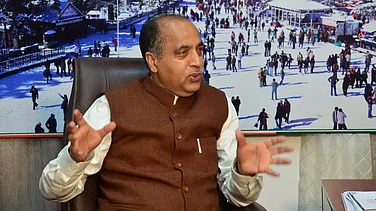I am no fan of Arnab Goswami. The Republic TV editor arrested by the Maharashtra police in a years-old suicide case does more harm than good to journalism by his hectoring every night. He has in more ways than one single-handedly destroyed television media’s credibility by unabashedly taking political sides and selectively targeting a chosen few to dramatise news and boost his channel’s TRP.
Yet, I object to his arrest that smacks of plain and simple vendetta.
First off, Arnab is no holy cow and the law of the land that he noisily swears by is as much applicable to him as to say, Rhea Chakraborty, the Bollywood actress and former companion of Sushant Singh Rajput whose death in June triggered a media trial led by none other than Republic TV. Arnab was at the forefront of the campaign that sought to implicate Rhea for Sushant’s death. Among everything else, Rhea was relentlessly accused of pushing Sushant to his death, if not plain murder. It is ironical that the same Arnab now stands accused of abetting a suicide, with the victim reportedly naming him in his suicide note. To cut a long story short, Arnab allegedly did not pay the person the money that was due to him, which apparently pushed him to end his life.
The charge is serious and calls for an investigation. But the manner it is being done leaves scope for a lot of distrust. Arnab’s bellicose and blatantly biased journalism has put him on a collision course with the Shiv Sena-led Maharashtra government with the state police desperately attempting to dig up as much dirt as possible on the TV editor. His channel is now being investigated for rigging TRPs and dozens of his journalists have been called in for lengthy interrogations on varied charges, including attempts to incite the rank and file of the police force against the Mumbai top cop. Still, his arrest in connection with a suicide that happened years ago by reopening the case that had been closed smacks of vendetta.
Arnab is at fault on many scores. But he is possibly right in claiming that the Maharashtra police are partisan and trying to fix him to please their political masters. Arnab should know, being a propagandist himself.
However, this use or abuse of the Mumbai police is no surprise. Arnab is high-profile and, therefore, he has had even a battery of central ministers coming out in support of him, condemning the arrest. But look beyond Mumbai and there is ample evidence to suggest that India has ceased to be a safe haven for journalists. Currently ranked 142 on a list of 180 countries in the World Press Freedom Index, we fare worse than Afghanistan and Mali.
Worse still, journalists at the receiving end of high-handed governments cutting across party lines rarely receive the same kind of support as Arnab is receiving.
Consider these: Manipur journalist Kishorechandra Wangkhem is back in jail for a Facebook post, having spent months in prison a year ago under similar circumstances. He was freed then, when the courts intervened, rapped the state government, and threw out the charge.
Though chastised, the state government has clearly not corrected its course and has thrown Wangkhem back behind bars. Another journalist—this one from Kerala—is currently in jail in Uttar Pradesh after being arrested on the way to Hathras. There are more such cases across the country if one cares to look for them, including in Kashmir, where reporters are being given a rough time. Besides, several journalists run the risk of arrests with FIRs being filed against them for their reports.
Many state governments, irrespective of which political party is at the helm, have perfected the art of targeting the media that is not pliant to them. Some are brazen and ready to face opprobrium as is the case with Maharashtra. Others such as the government in Odisha make less noise, mindful of avoiding a national uproar.
Owned by the family of BJP national vice president Baijayant ‘Jay’ Panda, OTV is by far the most popular Odia channel. It evidently, however, earned the displeasure of the state ever since Panda publicly fell out with chief minister Naveen Patnaik and quit his Biju Janata Dal (BJD). The going got tough for the Pandas and the channel since then. Panda had his helicopter seized over what later turned out to be a ‘non-existent’ violation, while a family-run industrial plant was shuttered over alleged infringements.
But it is OTV that now is seemingly bearing the brunt of the ‘displeasure’. Since the past two months, the channel has been slapped with no less than 15 cases and complaints—ranging from land grabs and sexual harassment to violation of disaster management laws —and has had its reporters summoned for repeated questioning by the police. While police whisked away one editor from the road for questioning in connection with a year-old case for which a charge-sheet had already been filed, the channel’s CFO is in jail for an alleged fraud.
Meantime, police have made repeated visits to the channel’s headquarters in full strength.
So, clearly, Arnab is not alone in his predicament. Examples of similar excesses perpetuated by those in power are plenty in this republic, and it is not limited to any one political party or state. It’s a larger malaise that threatens the country’s media, with Arnab being the latest victim. In all certainty, he won't be the last.


























